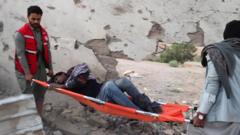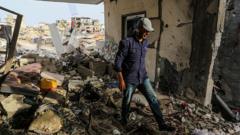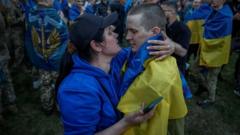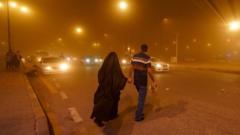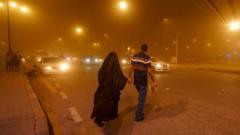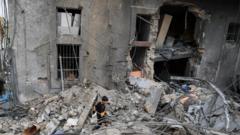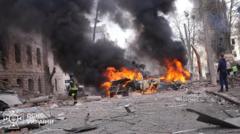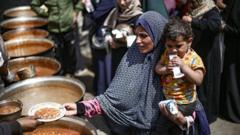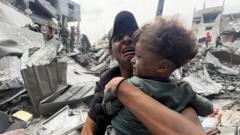**Sergele village in Iraqi Kurdistan is now at the forefront of Turkey's military operations against the PKK, straining the land and lives of its residents. Local testimonies reflect fears of an escalating conflict, while the Kurdish authorities appear reluctant to confront Turkey's influence.**
**Turkey's Expanding Military Presence Threatens Villagers in Iraq's Sergele**
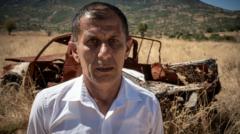
**Turkey's Expanding Military Presence Threatens Villagers in Iraq's Sergele**
**As Turkey increases its military footprint in Kurdish regions, local farmers face displacement and danger, with calls for accountability being silenced.**
In the heart of Iraqi Kurdistan lies the village of Sergele, once a flourishing agricultural hub known for its vibrant pomegranate, almond, and peach orchards. However, the village's status is under siege from Turkey's expanding military presence, with surrounding military bases now threatening the livelihoods of its inhabitants.
Sherwan Sergeli, a 50-year-old farmer from Sergele, laments the encroachment of Turkish forces on their land, framing it as an occupation of Kurdish territory. He suggests the Turkish military's establishment of bases, some of which overlook local farms and threaten vital resources, has eroded access to their once-abundant agricultural land.
The area has become part of the "Forbidden Zone," a swath of territory heavily impacted by Turkey's ongoing conflict with the PKK, a Kurdish militant group. As the Turkish military conducts operations against them, local civilians face significant risks, with reports indicating that hundreds have been killed by drone strikes and artillery fire in these contested zones.
The BBC's investigative reporting illustrates that since 2018, Turkey has significantly escalated its military infrastructure in northern Iraq, which now spans hundreds of military installations across the region. This military expansion doubles as a strategy to combat the PKK while inadvertently displacing civilians from their ancestral lands. Evidence from satellite images indicates that extensive roads built for military logistics have led to deforestation, impacting the local ecosystem.
Witnesses like Salam Saeed, a resident living near a significant military installation, describe a pervasive atmosphere of fear where drone surveillance is commonplace, making farming nearly impossible. With many families forced to flee their homes, communities such as Kani Masi illustrate the painful trajectory of villages under the shadow of military bases.
The Iraqi government has publicly denounced Turkey's military presence. However, its political reality, marked by reliance on Turkey for trade, water, and investments, often leads to a complicated relationship where formal protests are undermined by pragmatic cooperation. Confidential agreements hint at tacit acceptance, allowing the Turkish military to maintain a foothold under the guise of a counter-terrorism effort.
The Kurdish Regional Government, meanwhile, has built its political capital through ties with Turkey, often downplaying the collateral damage from military actions. While they assert that the Turkish military's goals center around confronting the PKK rather than civilian harm, many local voices contradict this narrative, providing personal stories of loss and destruction as civilian casualties mount.
Tragic incidents, such as the airstrike that claimed the life of a cancer patient named Alan Ismail, highlight the stark consequences of this conflict for civilians. Complaints lodged in local courts struggle against a backdrop of fear and repression, as families face barriers in seeking justice for their losses.
Despite ongoing violence and escalating tensions, there appears to be little political will from either the Iraqi government or the Kurdish authorities to challenge Turkish aggression. As the conflict deepens, ordinary citizens find themselves at the mercy of geopolitical struggles beyond their control, seeking not just their lands back, but also recognition for the costs endured in the ongoing turmoil.
Sherwan Sergeli, a 50-year-old farmer from Sergele, laments the encroachment of Turkish forces on their land, framing it as an occupation of Kurdish territory. He suggests the Turkish military's establishment of bases, some of which overlook local farms and threaten vital resources, has eroded access to their once-abundant agricultural land.
The area has become part of the "Forbidden Zone," a swath of territory heavily impacted by Turkey's ongoing conflict with the PKK, a Kurdish militant group. As the Turkish military conducts operations against them, local civilians face significant risks, with reports indicating that hundreds have been killed by drone strikes and artillery fire in these contested zones.
The BBC's investigative reporting illustrates that since 2018, Turkey has significantly escalated its military infrastructure in northern Iraq, which now spans hundreds of military installations across the region. This military expansion doubles as a strategy to combat the PKK while inadvertently displacing civilians from their ancestral lands. Evidence from satellite images indicates that extensive roads built for military logistics have led to deforestation, impacting the local ecosystem.
Witnesses like Salam Saeed, a resident living near a significant military installation, describe a pervasive atmosphere of fear where drone surveillance is commonplace, making farming nearly impossible. With many families forced to flee their homes, communities such as Kani Masi illustrate the painful trajectory of villages under the shadow of military bases.
The Iraqi government has publicly denounced Turkey's military presence. However, its political reality, marked by reliance on Turkey for trade, water, and investments, often leads to a complicated relationship where formal protests are undermined by pragmatic cooperation. Confidential agreements hint at tacit acceptance, allowing the Turkish military to maintain a foothold under the guise of a counter-terrorism effort.
The Kurdish Regional Government, meanwhile, has built its political capital through ties with Turkey, often downplaying the collateral damage from military actions. While they assert that the Turkish military's goals center around confronting the PKK rather than civilian harm, many local voices contradict this narrative, providing personal stories of loss and destruction as civilian casualties mount.
Tragic incidents, such as the airstrike that claimed the life of a cancer patient named Alan Ismail, highlight the stark consequences of this conflict for civilians. Complaints lodged in local courts struggle against a backdrop of fear and repression, as families face barriers in seeking justice for their losses.
Despite ongoing violence and escalating tensions, there appears to be little political will from either the Iraqi government or the Kurdish authorities to challenge Turkish aggression. As the conflict deepens, ordinary citizens find themselves at the mercy of geopolitical struggles beyond their control, seeking not just their lands back, but also recognition for the costs endured in the ongoing turmoil.


